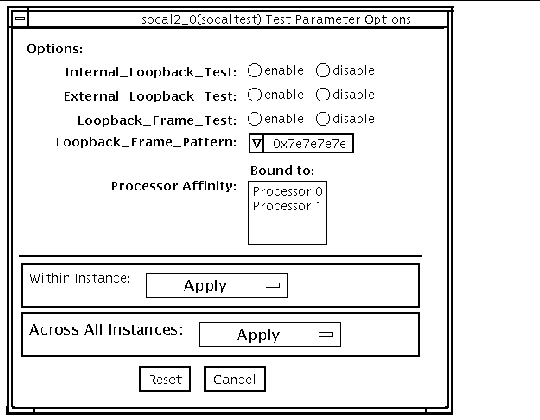Soc+ Host Adapter Card Test (socaltest) |
socaltest
aids the validation and fault isolation of the
SOC+ host adapter card. In the case of a faulty card, the test tries to isolate the fault to the card, the GBIC module, or the DMA between the host adapter card and the host memory.
|
Note - Do not run socaltest and enatest at the same time, otherwise test failures might occur.Do not run socaltest and disktest at the same time, otherwise test failures might occur.Do not run socaltest with a high system load. Running this test with a large number of instances and concurrency might cause resource limitations that cause this test to fail.
|
socaltest Options
To reach the dialog box below, right-click on the test name in the System Map and select Test Parameter Options. If you do not see this test in the System Map, you might need to expand the collapsed groups, or your system may not include the device appropriate to this test. Refer to the
SunVTS User's Guide
for more details.
FIGURE 49-1 socaltest Test Parameter Options Dialog Box

TABLE 49-1 socaltest Options
|
socaltest
Options
|
Description
|
|
Internal Loopback test
|
Checks the host adapter card and the direct memory access (DMA) with the host system. This is accomplished as follows:
-
A frame is created in the host adapter local memory, sent out through the SOC+ transmitter and internally looped back to the SOC+ receiver. The received data is compared with the original data.
-
A frame is created in the host adapter local memory, sent out through the SOC+ transmitter and looped back through the SERDES (serialiser-deserialiser) chip on the host adapter card. The received data is compared with the original data.
-
A frame is created in the host main memory, transferred through the DMA to the host adapter transmitter, looped back within the SOC+ chip, and transferred from the receiver to the host main memory through the DMA. The received frame is compared with the original transmitted frame, which tests the host memory to the host adapter DMA path.
|
|
External Loopback test
|
The External Loopback test verifies the proper functioning of the GBIC module. A frame is created in the host adapter local memory, sent out and looped back through the external loopback connector attached to the port. If the external loopback test is run together with the internal loopback test, the DMA path is also tested by creating a frame in host main memory, transferring it to the host adapter through the DMA, looping it back through the external loopback connector and transferring the received frame back to the host main memory by DMA.
|
|
Loopback Frame test
|
Sends out a buffer initialized with the selected pattern and compares it with the looped back frame. It passes if the two compare and fails if they do not.
|
|
Loopback Frame Pattern
|
List of selectable patterns for the Loopback Frame test.
|
|
Note Note - In addition to the tests described above, socaltest also tests the basic functions of the SOC+ chip, the on-board XRAM, and the host control buffer by invoking the appropriate tests implemented in firmware.
|
socaltest Test Modes
TABLE 49-2 socaltest Test Modes
|
Test Mode
|
Supported?
|
Description
|
|
Connection
|
No
|
Not supported
|
|
Functional
(Offline)
|
Yes
|
Runs the full set of tests
|
|
Note Note - You cannot run the Internal and External Loopback tests if the port is connected to a disk array.
|
socaltest Command-Line Syntax
/opt/SUNWvts/bin/socaltest
standard arguments
-o dev=
device name
,elb=
enabled|disabled
,ilb=
enabled|disabled
,lbf=
enable
|
disable
,ptn=
pattern
TABLE 49-3 socaltest Command-Line Syntax
|
Argument
|
Description
|
|
dev=
device name
|
The name of the socal port to be tested.
|
|
elb=
enabled|disabled
|
Enables or disables the External Loopback test.
|
|
ilb=
enabled|disabled
|
Enables or disables the Internal Loopback test.
|
|
lbf=
enable
|
disable
|
Enables or disables the Loopback Frame test.
|
|
ptn=
pattern
|
Specify the pattern in hexadecimal, for example:
ptn=0x7e7e7e7e
|
|
Note Note - 64-bit tests are located in the sparcv9 subdirectory: /opt/SUNWvts/bin/sparcv9/testname. If a test is not present in this directory, then it may only be available as a 32-bit test. For more information refer to 32-Bit and 64-Bit Tests.
|
|
SunVTS 5.0 Test Reference Manual
|
816-1667-10
|




|
Copyright
© 2002, Sun Microsystems, Inc. All rights reserved.
